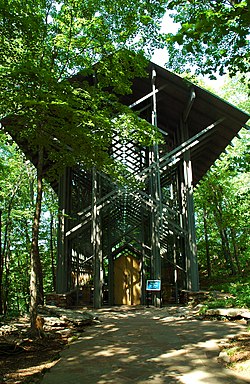Thorncrown Chapel
Thorncrown Chapel | |
 | |
 Location in Arkansas | |
| Nearest city | Eureka Springs, Arkansas |
|---|---|
| Coordinates | 36°24′59″N 93°46′22″W / 36.41639°N 93.77278°WCoordinates: 36°24′59″N 93°46′22″W / 36.41639°N 93.77278°W |
| Area | 7.6 acres (3.1 ha) |
| Built | 1980 |
| Architect | E. Fay Jones |
| Architectural style | Modern |
| MPS | Arkansas Designs of E. Fay Jones MPS AD |
| NRHP reference No. | 97000452[1] |
| Added to NRHP | April 28, 2000 |
Thorncrown Chapel is a chapel located in Eureka Springs, Arkansas, designed by E. Fay Jones, and constructed in 1980. The design recalls the Prairie School of architecture popularized by Frank Lloyd Wright, with whom Jones had apprenticed. The chapel was commissioned by Jim Reed, a retired schoolteacher, who had purchased the land in 1971 and envisioned a non-denominational pilgrimage chapel set apart in the landscape for meditation. The design of Thorncrown Chapel was inspired by the Sainte-Chapelle, a Gothic church in Paris, France, containing many windows and different types of glass to allow more light into the structure.
The chapel was selected for the 2006 Twenty-five Year Award by the American Institute of Architects, and was listed on the National Register of Historic Places in 2000,[1] a status not granted to buildings fewer than fifty years old unless exceptionally significant.[2] It was included in Budget Travel's list of "12 Most Beautiful Churches in America"[3] and Bored Panda's list of "50 Most Extraordinary Churches Of The World."[4]
Structure and status[]

The chapel stands 48 feet (14.6 meters) high, 24 feet (7.3 meters) wide, and 60 feet (18.3 meters) long.[5] It has 425 windows, which add up to 6,000 square feet (approximately 560 square meters) of glass. During the design process, Jones decided that in order to preserve the site's natural setting, no structural element could be larger than what two men could carry through the woods. The structure was constructed using organic materials indigenous to northwestern Arkansas including pressure-treated Southern pine and flagstone for the floor and surrounding wall. The small ornamental roof skylight was later enlarged to provide additional natural lighting throughout the chapel.[6]
The chapel looks like an open-air structure, but is, in fact, an enclosed air-conditioned space that seats up to 100 people. It is open daily from March to December with free admission, and is closed January and February except for weddings and other special events. Non-denominational church services are held in the adjoining worship center on Sundays from April to December.[7]
See also[]
- Mildred B. Cooper Memorial Chapel, similar chapel built by Jones in nearby Bella Vista, Arkansas
- National Register of Historic Places listings in Carroll County, Arkansas
References[]
- ^ a b "National Register Information System". National Register of Historic Places. National Park Service. March 13, 2009.
- ^ "How to Apply the National Register Criteria for Evaluation," (PDF), National Register Bulletins, National Park Service, 6. Accessed 2009-12-06.
- ^ "12 Most Beautiful Churches in America". 21 January 2014. Retrieved 31 July 2016.
- ^ "50 Most Extraordinary Churches of the World". Retrieved 31 July 2016.
- ^ "Thorncrown Chapel Architecture". Thorncrown Chapel. Retrieved 21 July 2020.
{{cite web}}: CS1 maint: url-status (link) - ^ Watson, Stephanie A.; Kucko, Jane K. (2001). "Thorncrown and the Mildred B. Cooper Chapels: Sacred Structures Designed by Fay Jones". Journal of Interior Design. 27 (2): 14–25. doi:10.1111/j.1939-1668.2001.tb00474.x. ISSN 1939-1668.
- ^ "Thorncrown Chapel Visitation and Services". Thorncrown Chapel. Retrieved 21 July 2020.
{{cite web}}: CS1 maint: url-status (link)
Further reading[]
- Charles K. Gandee. (March 1981) "A Wayfarer's Chapel By Fay Jones", Architectural Record. Vol 169 Number 3. pp. 86–91
- Paul Heyer. (1993) American Architecture: Ideas and Ideologies in the Late Twentieth Century. New York: Van Nostrand Reinhold, pp. 102–103. ISBN 0-442-01328-0
External links[]
| Wikimedia Commons has media related to Thorncrown Chapel. |
- Thorncrown Chapel official website.
- Thorncrown Chapel Special Collection in the Fay Jones Collection at the University of Arkansas Library.
- Thorncrown Chapel at Great Buildings Online.
- Thorncrown Chapel at the American Institute of Architects.
- Churches in Arkansas
- Properties of religious function on the National Register of Historic Places in Arkansas
- Chapels in the United States
- Churches completed in 1980
- Buildings and structures in Eureka Springs, Arkansas
- Tourist attractions in Carroll County, Arkansas
- National Register of Historic Places in Carroll County, Arkansas

